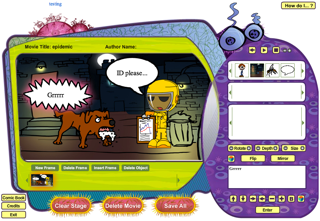Epidemic: Learning Games Go Viral
DOI :
https://doi.org/10.25071/1916-4467.30960Résumé
In this case study, we document the development and user-testing of Epidemic: Self-care for Crisis, an online educational resource that invites users (aged 14-20) to develop game-based knowledge and practices around prevention, self-care and (mis)information in the face of contagious diseases - a timely project, given the ongoing anxieties, and false (and not so false) alarms, over SARS, Avian Flu, and H1N1. The game Contagion, the forerunner to Epidemic, mobilized the conventions and mechanics of single-player adventure games to engage players 'experientially' with health- and disease-related understandings: we configured the same basic self-care information as "narrative knowledge", intended to mobilize players' attention and intelligence voluntarily, using narrative as a rhetorical strategy. We were using narrative's traditional, paradigmatic function within literate cultural forms of interpellation - stories of playful, pleasurable persuasion designed to engage players,
Epidemic takes a decidedly different tack towards delivering the same educational content. Reconfiguring digital play within social networking conventions affords us a design-based platform for fundamental theory development in game-based learning. Epidemic's modular, Flash and XML-based design allows for accessible and straightforward creation and editing of educational content, both textual and visual: players can generate and publish their own virus-like avatars, stop-motion animations, and disease-related public service announcements. Some interesting divergences in play-based education on community health/self care, between interactive narrative and social-networking configurations for ludic knowledge representation, appear noteworthy.
Our user-testing, we argue, signifies a further innovation in the field of educational game design, leaving behind the clichéd concern over 'what did you learn today' in favor of focusing on when and how laughter, engagement and attention are most at work. Taken together, these innovations instantiate an approach to digitally-mediated learning that construes and practices assessment differently than in traditional education (and in educational technology design), which are more concerned with propositionally identifiable learning outcomes. In the case of Epidemic, however, we are more concerned with how play-based learning design can best support the cultivation of responsible and critically-informed attitudes towards public health.
Téléchargements
Publié-e
Comment citer
Numéro
Rubrique
Licence

Copyright for work published in JCACS belongs to the authors. All work is licensed under a Creative Commons Attribution-ShareAlike 4.0 International license.


